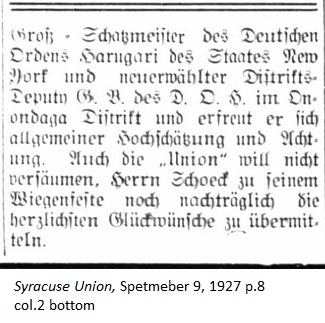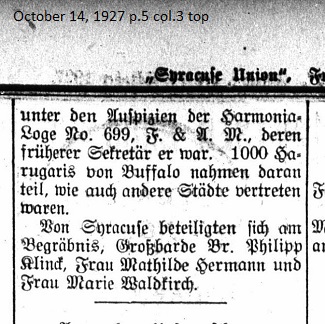July - December 1927
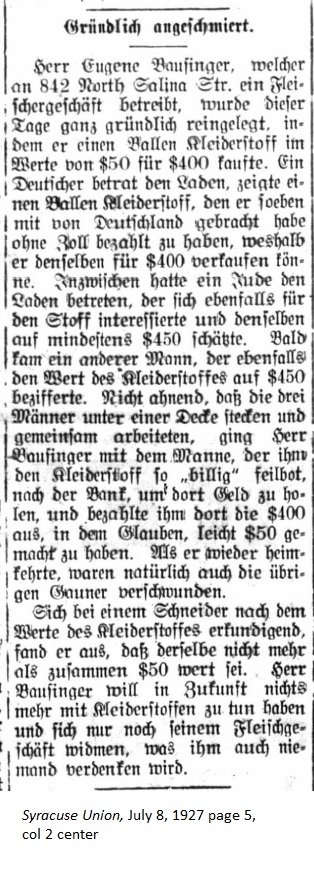
| July 8, 1927 page 5 _____ Mr. Eugene Bausinger, who lives at 842 North Salina St. and operates a butcher shop, was totally taken advantage of today when he bought a $50 bolt of clothing fabric for $400. A German walked into his shop, showed him a bolt of fabric which he had supposedly brought with him from Germany without having to pay the customs duties, thus he was able to sell it for only $400. In the meantime a Jew entered the shop, who just happened to be interested in the fabric and who estimated the bolt's worth at least for $450. Soon another man came in who figured its value at $450. Never suspecting that the three men might be working together, Mr. Bausinger went to the German, who had offered to sell him the fabric at such a "bargain" price, then to the bank where he took out $400 and gave it to the seller. He believed he could easily make $50 profit but when he returned to his shop the grifters had, of course, disappeared. Going to a tailor to find out how much the fabric was worth, he found out tht the bolt was worth no more than $50. In the future Mr. Bausinger will have nothing more to do with yard goods and confine himself to his butcher business. No one can blame him for this. |

|
July 22, 1927 page 1 _____ Germany's greatest surviving wartime aviator, Ernst Udet, intends to fly on September 5th from Hamburg to New York accompanied by two people and make the return flight within one week. Much luck on the journey! |

|
August 12, 1927 page 1 _____ Emil Kant, great-grandnephew of Immanuel Kant, the famous German philosopher who for years has been sought throughout the world by the Kant Society of Königsberg, was buried on July 30 in isthmus soil. He had lived for 40 years in exile. While Emil Kant studied medicine at the University of Dorpat he was conscripted into the army, where he did not find things to his liking. He deserted after having a dispute with his commanding officer and fled to Africa. Later he went through Costa Rica to the United States, where he worked on the railroad. Subsequently he went to Panama and settled in the Province of Chiriqui, where he married. Soon after his flight from Germany the Kant Society began to search for him without success until his whereabouts were newly discovered when a local newspaper, the Star-Herald released a report that he was sick. Documents of the Kant Society for information on his location soon reached the consul. He died in Ancon Hospital of heart disease and was survived by three sons and five daughters. |
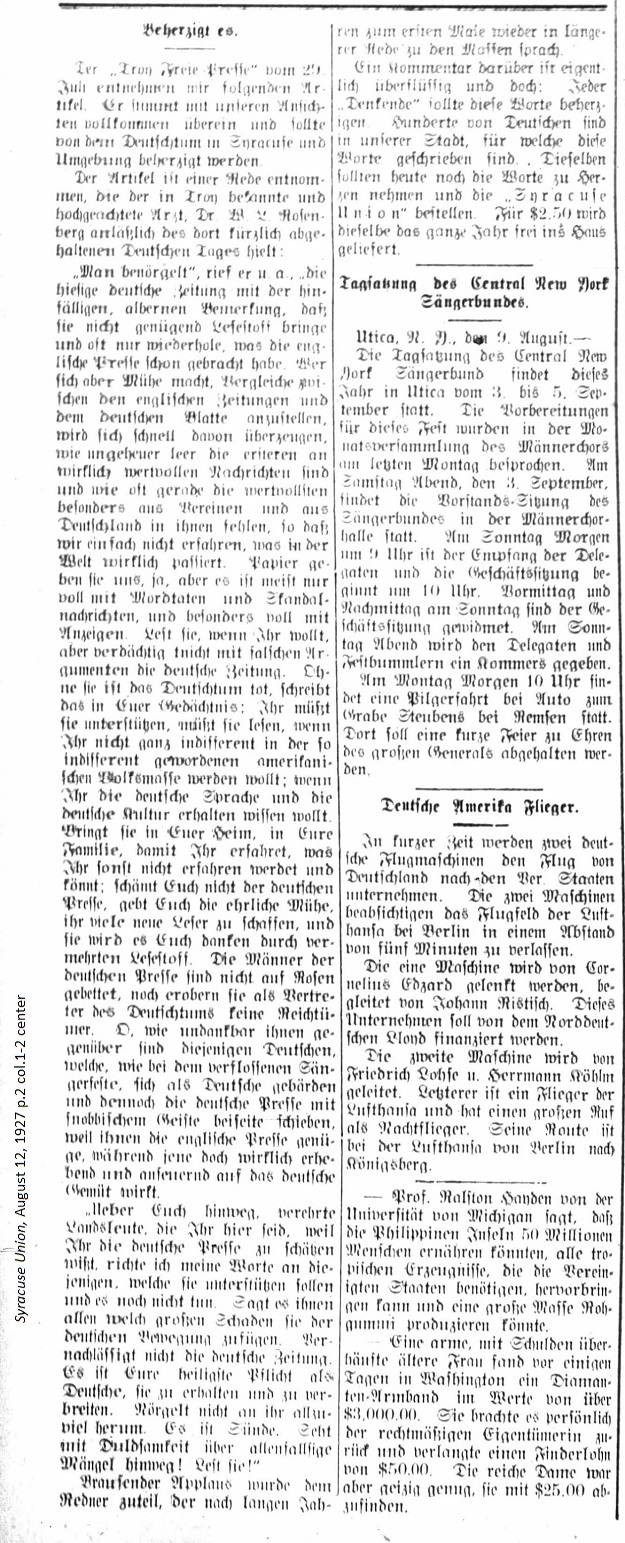
|
August 12, 1927 page 2 _____ We're reprinting a July 29th article from the Troy Freie Presse. It's in complete agreement with our opinions and should be heeded by the German communities in and around Syracuse. The article discusses a speech by the well-known and highly respected Troy physician Dr. W.L. Rosenberg given recently during the German Day celebration: Among other things the doctor said, "In ridiculously vapid terms people complain that the local German newspaper does not have enough reading material and it often just repeats what the English language press has published. However anyone who takes the time to compare the English newspapers with the German newspaper will quickly be convinced how dreadfully empty the former's content really is, lacking in reports from local associations and Germany. We simply learn nothing about what's happening in the world. Yes, the papers are full of reports on murders and scandals and they're especially full of advertising . Read them if you want but be wary of false arguments. Without the German press the German community is dead — inscribe that in your memory. You must support it. You must read it if you do not want to be completely indifferent in the oh, so indifferent American population; if you want to retain your German language and your German culture. Bring it into your home and to your family so they will learn what they would not learn elsewhere. Don't be ashamed pf the German press. Make every effort to bring in new readers. The press will thank you by publishing more reading material. The men of the German press have no bed of roses and they don't get rich as representatives of the German community. Oh, how ungrateful are certain Germans who during past song festivals behaved like Germans yet snobbishly pushed the German press aside since the attention of the English press uplifted and pleased the German temperament. "Dear countrymen, some of you here know how to value the German press. I'm directing my words to those who should support it but don't. Let me tell you how much harm you cause the German movement. Do not neglect the German newspaper. It is your sacred duty as a German to maintain and distribute it. Don't gripe about it. It's sinful. Be patient with its shortfalls. Read it!" The speaker received thunderous applause. It was the first time in many years that he had delivered a lengthy speech to the masses. A commentary to the address would be superfluous. Any thinking person should take these words to heart. There are hundreds of Germans in our city for whom this speech is printed. May they take these words to heart and subscribe to the Syracuse Union. For $2.50 it will be delivered postage free to their houses. Meeting of the Central New York Sängerbund _____ Utica, N.Y., August 9th — The meeting of the Central New York Sängerbund will take place this year from September 3rd until the 5th. Preparations for this festival were discussed last Monday at the monthly meeting of the men's choir. On Saturday evening, September 3rd the Sängerbund board will meet in the Men's choir hall. Sunday morning at 9 AM is the reception for delegates. The business meeting will begin at 10 AM. On Sunday morning and afternoon another business meeting will be conducted. Sunday evening there will be a get together for the delegates and festival guests. On Monday morning at 10 AM a car trip will go to Steuben's grave near Remsen. While there a brief ceremony will be held to honor the great general. German Flight to America _____ Two German airplanes will undertake a flight from Germany to the United States. The two planes intend to depart 5 minutes apart from the Lufthansa airfield in Berlin. The first machine will be flown by Cornelius Edzard. He will be accompanied by Johann Ristisch. This undertaking will be financed by North German Lloyd. The second machine will be flown by Friedrich Lohse and Herrman Köhlm. The latter is a Lufthansa pilot and has a fine repuation as a night aviator. The route goes from Lufthansa in Berlin to Königsberg. A poor, elderly women overburdened with debt found a diamond bracelet valued at $3000 a few days ago in Washington. She personally brought it back to its rightful owner and requested a $50 finders fee. However the rich woman was stingy and only paid her $25. |

| August 19, 1927 page 2 col.1-4 On the forthcoming State Convention of the German Order of the Harugari Caption under top photograph: Elisabeth Lodge No. 22, German Order of the Harugari, which this year inducted the most new members into the sister lodge. A singing society was established, which will sing during the convention. In the foreground, Walter E. Mossdorf, Grand Secretary of the New York State Order [and editor of the Syracuse Union]. Caption under center photograph: The Induction Staff of the Augusta Lodge, German Order of the Harugari, which on Thursday, August 25th will perform an exercise drill under the direction of Drill Mistress Mathilde Hermann. Caption under bottom photograph: German Watch Lodge No. 283, German Order of the Harugari, which this year carried away the silver loving cup for induction of the most members for the second time. |

|
August 19, 1927 page 2 _____ The sesquicentennial celebration in Oriskany and Rome is over. It was a success in every way. Magnificent weather favored the festivities. Thousands of people from near and far joined in. High officials of the state were present. Modern technology played its part with the number of aircraft from the Army and the Navy. The deeds of heroic patriots, who fought, bled and died at Oriskany, were praised and described in glowing terms. Only one fact unspoken, unnoticed, or intentionally forgotten was left unmentioned. That fact is that the battle of Oriskany was fought on the American side primarily by Germans. Here we iterate words spoken 50 years ago by Lieutenant Governor William Dorsheimer in his address at the centennial celebration of the Battle of Oriskany: "You Germans, who hear me, you have abundant reason for pride. No more important battle has ever been fought in this country. Nowhere with an opportunity for escape have troops endured so severe a loss; never has a battle which had begun with disaster been turned into victory more complete. And this was a German fight. The words of warning and encouragement, the exclamations of passion and of pain, the shouts of battle and of victory, and the commands which wounded Herkimer spoke, and the prayers of the dying, were in the German language. You may well be proud of it, for it is the contribution which men of your race have made to the work of American independence." These historic facts, which should be known to even the most superficial student of history, were left unspoken or even implied at the celebration of the 150th anniversary of the battle. Speaking the truth doesn't just means not saying something that is wrong. It also means not keeping quiet about what is true. Anyone who knows the facts and heard the speech last Saturday or read the newspaper report on it couldn't help but feel that the truth was not fully and completely covered. The German associations of the city took part in the celebration through their representative of the Carl Schurz Society. A laurel wreath was laid at the foot of the memorial which had a large silk ribbon embossed with the name "Carl Schurz Society." The wreath was the only decoration placed at this memorial on this great day of remembrance. Utica Deutsche Zeitung |

|
August 19, 1927 page 5 _____ Begins Wednesday Evening, August 24th and officially ends Friday Evening with a large Banquet. _____ Hundreds of Delegate from various Sections of the State to take part _____ On Wednesday next week male and female representives of the lodges of the German Order of the Harugari will host the annual meeting of the New York Grand Lodge in the Harugari Hall on Butternut St. The rest of the week will be used to conduct business. Out of town guests are used to receiving the best reception and entertainment here in Syracuse. Committee members of the German Watch Lodge, the Elisabeth Lodge and the Augusta Lodge will make every effort to have things in readiness so that visitors will experience fine hospitality and pleasant amenities during their two day stay. The public reception for visiting delegates and guests will take place Wednesday evening in the headquarters of the Harugari Temple, where all meetings and merrymaking will be held. The mixed choir of the Harugari singing societies will entertain with a song in welcome composed by Walter E. Mossdorf, the Grand Secretary of the State of New York German Order of the Harugari. The Germania will perform the songs "Schäfers Sonntagslied" by Kreutzer and "Bundeslied" by Modart. The ladies choir will perform "Hei, wie die Lerchen singen" by H. Broll under the direction of conductor Professor Fred Beiling. Mr. Jacob Kiehl, best known for his guitar and song recitals, will perform a few numbers as will Deputy Senior Grand Bard Friedrich Kreutzer. This pleasant entertainment should induce delegates and guests to become acquainted and it will be followed by a dance with music by Altmann's Orchestra. Thursday morning at 9 AM the meeting of the Grand Lodge will take place with opening address by Mayor Charles Hanna. That evening at 7:30 there will be a social with dance. Zahn's Harmonist Orchestra will provide the music. Mrs. Katherine Schwab will recite a poem in welcome. The Elisabeth Singing Society will sing "Frühlingslied" by C. Schiebold and "Das Elternhaus" by A.A. Büchse. "Das vertauschte Zwillingspaar" will be performed by Brother Kiehl with piano accompaniment by Mrs. Rosa Pick. The Augusta Drill Team, under the direction of Mrs. Mathilde Hermann, will perform exercises. "Wenn das Wörtlein wenn nicht wär" will be performed by J. Kiehl. Young dancer Ruth Michels will entertain with a solo dance. A poem, "Lasst uns die Toten ehren," written and recited by Walter E. Mossdorf, shall be dedicated to members of the Order who have passed away in the past year. Relatives of departed members Adam Metzger and Ludwig Schwab will provide flowers for the occasion. A raffle for 20 prizes and a dance will close the evening. Friday morning, August 26th, the Grand Lodge meeting will continue and during the course of the day it will close with the election and installation of officers. In the evening at 7:30 there will be a large banquet with Walter E. Mossdorf as toastmaster. Miller's Orchestra has been engaged for the evening. The Germania Singing Society will perform three songs, "Der Rhein," "Heidenröslein," and "Bankettlied." The Honorable Louis Will, former mayor of Syracuse, current mayorial candidate, and honorary member of the Order is among the speakers as are former Senior Grand Bard George Gebauer of Buffalo, former Senior Grand Bard Eugene Ullmicher of New York, Deputy Senior Grand Bard of Pawtucket, R.I. Friedrich Kreutzer,and others. The banquet will close with a singalong of "My Country 'tis of Thee." The rest of the evening will be filled with dancing. The current Grand Lodge officers are:
Among the delegates there are:
Naturally a large number of guests will come here with the delegates and the Olga Lodge in Auburn has decided all members will attend. Most delegates and guests have reserved rooms in the Hotel Syracuse and Onondaga Hotel. A portion of these visitors will arrive over the next few days. All members of the local lodges are invited to the entertainments and the banquet but not the Grand Lodge meeting. Reservations for the banquet must be sent to the convention committee secretary by Monday at the latest, addressed to Max Schneider, 309 Wadsworth St. As is apparent from the preceding paragraphs, the committee has omitted no preparations to give the guests hours of enjoyment. The Harugaris of Syracuse have taken part in every detail in order to show how strong the Order in Syrcuse is. A 36 page souvenirt program will be distributed during the convention. Wednesday, Thursday and Friday of next week the Harugari temple will be the Mecca to all Harugaris. We render a heartfelt "Welcome to Syracuse" to the delegates and guests coming from all parts of the state. Boulevard opened _____ Erie Boulevard between W. Genesee St. and Milton Ave was officially reopened yesterday afternoon with celebrations in which the mayors of Syracuse and Solvay shook hands in order to signify the creation of a kinship between the city and the town. Brazen Burglars _____ Mr. Louis Seib of 2010 Park St., who owns a kiosk at that location, had an unwelcome visit by thieves in the night, who took a quantity of meat, cigars, cigarettes, soft drinks, etc. Mr. Seib wondered why the brazen thieves didn't just take the entire booth with them. |
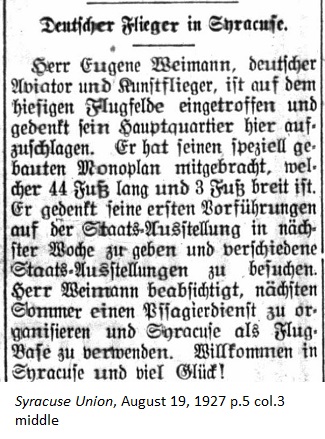
|
August 19, 1927 page 5 _____ Mr. Eugene Weimann, German aviator and acrobatic pilot, has arrived at the local airfield and intends to establish his headquarters here. He has brought his specially built monoplane with him. It is 44 feet long and 3 feet wide. He will give his first performance at the State Exposition next week then visit various other state expositions. Mr. Weimann intends to organize a passenger air service next summer with Syracuse as the base of operations. Welcome to Syracuse and good luck! |

|
September 9, 1927 page 4 _____ The first issue of the Syracuse Union appeared September 4, 1852. Our newspaper, which with today's issue begins its 76th year of existence, can look back with pride that it was published every week of its 75 year history. Even during the dark war years it continued to survive. The Syracuse Union stands at the threshold of the last quarter of a century. It's up to the German community in general whether the Syracuse Union will celebrate its 100th birthday. It is the link between the German associations in Syracuse and the link to the old homeland, the mother tongue, and everything that is German. Please read the only German newspaper published in Syracuse and try to bring onboard new readers. Rooted in the firm soil of true American culture, our newspaper advocates for the attainment of pure democracy — and it will remain steadfast in its task. A stronghold of progressive endeavor, it has been relentless since its founding in preparing the German mind and body for a new home within the country of the star spangled banner. It places itself at the service of the American populace — and in the future it will proudly continue to perform this task. While the Syracuse Union today enters its 76th year, the banner will continue to number it as Volume 75 until January 1st. We have always renumbered the volumes at the beginning of the New Year. |
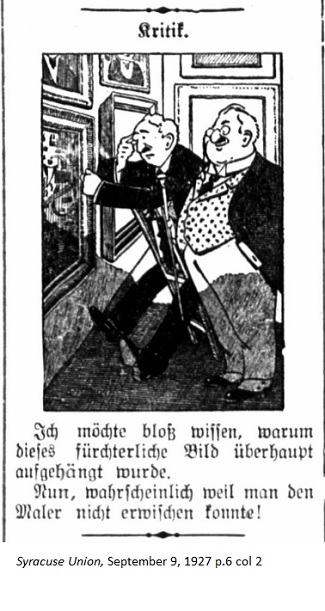
|
September 9, 1927 page 6 I'd just like to know why they hung that dreadful picture in the first place. Probably because they couldn't find the painter! |

|
September 9, 1927 page 8 For Mr. Schoeck on the Occasion of his 59th Birthday _____ If one isn't suspecting anything mischievious, a surprise is doubled in effect. This was the case last Friday evening in the home of Mr. Frank Schoeck of 319 Rowland St., who passed yet another milestone in life. This is usually something a person doesn't think about once he reaches his 40s or 50s. Mindful of the forgetfulness of the birthday boy, his friends and relatives planned a surprise party, which brought happiness in the fullest sense of the word. Prepared for every eventuality, those offering congratulations catered the affair with the best in food and drink. There was no lack of lively conversation, which demonstrated the fond feelings guests had for Mr. Schoeck. It was long after midnight before the guests left his house. The birthday celebration continued on Sunday at Mr. Frank Schoeck's summer house on Lake Oneida. It took the form of a corn roast and all participants were wonderfully entertained. Dancing, music, conversation, excellent food and "fine" drink from Lake Oneida and other places left nothing to be desired. All participants, along with the birthday boy, wished to celebrate the day for many more years to come. Present at the event were: Mr. and Mrs. Sam Schoeck, Mr. and Mrs. Frank J. Schoeck Jr., Mr. and Mrs. Jacob Wohlieber, Mr. and Mrs. John Knabel, Mrs. Minnie Wohlieber, Friedrich Wohlieber, Francis Schoeck, Arthur Knabel, Miss Helen Schoeck, Arlene Knabel, and Mr. and Mrs. Frank Schoeck Sr. In addition to these at the corn roast on Lake Oneida were Mr. and Mrs. Paul Schöck, Mr. and Mrs. Michael Knabel, Mr. and Mrs. August Bremmer, Mrs. F. Böckle, Wm. Bremmer and Helene Bremmer. Mr. Schoeck is the president of Schoeck Manufacturing Co., founder and first preseident of the Harugari Temple Association, re-elected Grand Treasurer of the German Order of the Harugari of New York State, and newly elected District Deputy Grand Bard of the German Order of the Harugari in the Onondaga District. He enjoys the respect and admiration of all, and the Union will not neglect to offer its heartfelt, albeit belated, best wishes. |

|
September 23, 1927 page 4 _____ In Europe last Sunday in two different places the question of war guilt surfaced. Hindenburg spoke at the unveiling of the third tower of the Tannenberg Memorial in East Prussia. Poincaré raised the question in his welcoming address to the representatives of the American Legion in Paris. Hindenburg's address was brief, concise, and clear. He said, "The Tannenberg Memorial is dedicated to the memory of those who fell in the fight for the freedom of the fatherland. However their memory and the honor of those comrades still living compels me here to solemnly declare that we reject the accusation that Germany bore the guilt for the greatest of all wars. All classes of German people reject it. It was not hatred, or jealousy, or the desire to conquer for which we drew the sword. To the contrary, the war which demanded so many dreadful sacrifices throughout the land, was an extreme measure taken in order to protect our very existence against a world of enemies. We marched off with pure hearts to defend our fatherland. With pristine hands we took up the German Army's sword. Germany is always ready to prove these facts before an impartial judge." How different sounding are the words that Poincaré used. He described to representatives of the American Legion how German machinations forced America into the war, how the American Army came to France, "what an honorable role they played," etc. In opposition to Hindenburg's comments Poincaré said, "Neither you nor we will allow our interpretation to be doubted." |

|
September 23, 1927 page 5 _____ Dear Sirs! "Ultimately it has been difficulty and hard work!" It's certainly not my way to quote the Bible, but these words are truly appropriate when a newspaper, especially a Germany provincial newspaper in this country, can look back on 75 years of its existence. And no one knows better how to appreciate this than we in the profession! Sincere congratulations are in order along with the hope that the Syracuse Union may be granted the continuation of its mission for many years to come. As a Steubenite, as chairman of the Herkimer County Unit No. 627, Steuben Society of America, I am commissioned to express to you the wish that the Union help us by exerting its influence over the German population and those of German extraction so that a new unit of the Steuben Society may be established in the Salt City to fill the void which currently exists and to work with us towards the noble goals already set by this might organization! With heartfelt wishes for a happy future,
Our heartfelt congratulations. When a German newspaper in this country can celebrate the diamond jubilee of its inception it's well worth taking a moment to notice the occasion. The Syracuse Union in Syracuse, N.Y. is seventy-five years old but remains young and fresh in its mission as preserver of the German language and culture plus the advocate for all the goals of the German-American community. In order to accomplish its mission and reach its intended goals the Syracuse Union, its publisher Alexander Oberlander, and its genial current lead editor Walter E. Mossdorf perform a great service. May the readers of the Syracuse Union keep in mind that defending and advocating such goals of the German populace create no bed of roses for the newspaper's publishers. Your German newspaper achieves grand and unmatched accomplishments. It is the German newspaper which salvaged German moral prestige in the postwar years. Without German newspapers after the war a hundred years of work by our ancestors would have receded into nothingness. Nothing was and is more necessary to the preservation of German thought than a German press. May this admonishment find close attention among the German element. And now may the Syracuse Union stand tall for many years to come in its mission as the guardian of the important German issues. Sincere congratulations ____ Washington, D.C., Sept. 27 To the owner and lead editor of the Syrcuse Union: Dear fellow citizens! As I offer belated congratulations to your valuable newspaper on its 75th birthday I wish to fulfill a debt of gratitude for a brave newspaper in America which not only survived the difficult war years when others simply vacated the field but also became a personal friend and assistant to me in my posting at St. Peter's Church. For the 15 years since moving to the nation's capitol it has remained a beloved link to former parish children and friends. Thus wishing the Syracuse Union many more years of blissful activity, with sincere greetings, Richard Schmidt,
|
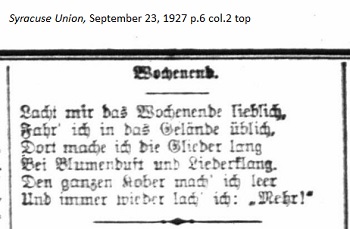
|
September 23, 1927 page 6 The weekend is filled with laughter,
|

|
September 23, 1927 page 8 _____ Mr. Theodore Kuhl of Syracuse, who visited the old homeland for nearly half a year, safely returned early Friday morning. He made the voyage on the steamship "Derflinger" to New York and was welcomed back to America by his son and daughter-in-law Ferdinand and Ida Kuhl, also of Syracuse. Mr. Kuhl had made the trip back to the old homeland four times, having spent time in the old homeland last year too despite his seventy years of age, about which one would never have guessed. He described conditions in Germany as getting better with each passing year although there is no parity between cost of living and wages as there is here. How much Mr. Kuhl is loved by his relatives and friends in the old homeland is demonstrated by a "Farewell" which arrived on Tuesday morning by post from Germany to the Union office: It was in spring as lilacs bloomed in the garden.
Then, dear uncle, we found you before us,
You told of your joys and your sorrows,
Once again, the ocean divides us,
Greetings from us all in the Rhineland,
Next spring, if God so wills it,
May health, vigor and peace always be with you, dear Uncle Theodor from America! The devoted Family of Johann Kuhl |
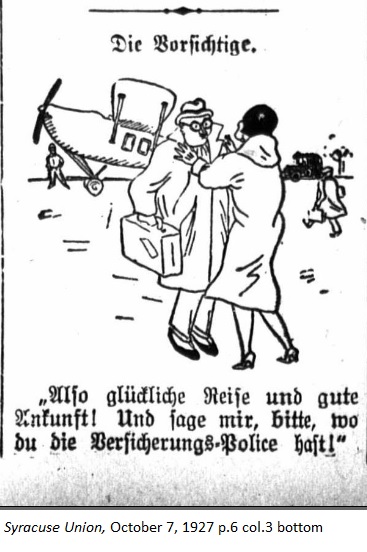
|
October 7, 1927 page 6 "Have a good trip and a soft landing! Oh, would you please tell me where you keep the insurance policy?" |

|
October 7, 1927 page 8 _____ Whenever visitors come to the northside of our city, they will be greeted in a very artistic manner, which cannot be repeated in any other city in New York State. The German community of Syracuse can boast of three monuments in which we are justifiably proud. The oldest monument commemorates our former chief of the fire department, Charles Eckel, who was always among the first arrivals to battle the dreadful element with the hose. Recently the monument received a new coat of sandstone thanks to the city government. Not far from this is the Sniper Monument, which commemorates the year 1861 in which boys and men, unafraid to die, united for the benefit of the country under General Gustav Sniper, who brought honor to his German name due to his service. Then we come to the third monument in Schiller Park, dedicated to the poets Goethe and Schiller and recently decorated with a surrounding flower bed, benches, and recreation area by the Parks Department. The monument was manufactured at the Württemberg Metalworks Factory in Gaislingen, a poet-rich region of Swabia in the year 1911 and donated to Syracuse Mayor Edward Schönecke by the local German Association as a gift to the city. However Mr. Clarence Howard of the Parks Department deserves heartfelt thanks for his efforts on behalf of the German community. He provided a magnificent makeover of the surroundings for the Goethe-Schiller Monument. |
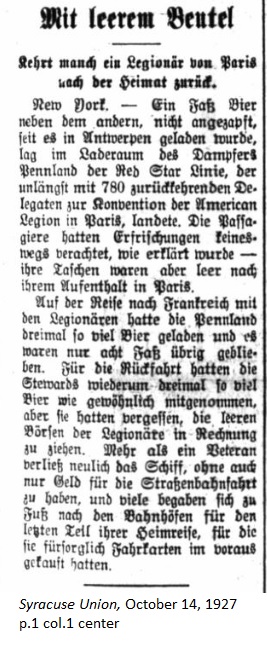
|
October 14, 1927 page 1 _____ Many a Legionnaire from Paris returns to his Homeland On the voyage to France with the Legionnaires the Pennland loaded three times as much beer but only eight barrels remained. For the return voyage the stewards again loaded three times as much beer as usual but they forgot to take into account the Legionnaires' empty pockets. More than one veteran left the ship without having money for the trolley ride and many went on foot to the railway station for the last portion of their journey home, having judiciously purchased their tickets in advance. |

|
October 10, 1927 page 5 _____ George H. Gebauer dead _____ The oldest former Senior Grand Bard of the United States Order of the German Harugari dies _____ At the beginning of this week we received sad news from Buffalo concerning the passing of Mr. George H. Gebauer, who after an active and productive life passed away last Saturday at the age of 72 years. Mr. Gebauer was well known and regarded by the German community of this city, especially among the Harugaris. He attended the last convention of the Order held here back in August, during the banquet of which he proposed a toast to the Order of the Harugari. He sat to the left of toastmaster Walter E. Mossdorf and to the right of our esteemed brother Louis Will. The toastmaster dedicated a toast to Mr. Gebauer during the banquet, the words of which the now deceased excellently epitomized: You accepted the highest offices,
Your quiet demeanor has never abandoned you,
May God, Our Lord, keep you with us,
Mr. Gebauer was born in Heringen, Hessen-Kassel, and came to America and Buffalo at the age of 17. For more than 25 years he made a living in the delicatessen business. He was so successful that he opened a number of branches in Buffalo which served a large number of customers. He was secretary of Johnson City Savings Bank and Loan Association, former president of Harding Oil Corporation and member of many associations such as the Sterlin Lodge, F.O.O.F., the Buffalo Consistory, and the Buffalo Orpheus, the Teutonia Liederkranz, and the Hoffnungs Mannie Lodge as a 32 degree Free Mason. Along with all these duties Mr. Gebauer was a man who was specifically devoted to German interests. He preferred the German language, which he spoke fluently and correctly right up to his death. He was a member of the German Order of the Harugari and all its neighboring lodges. Mr. Gebauer honorably and uniquely held every high office in the German Order and offices in other States of the Union. He was the oldest former Senior Grand Bard in the United States and there was no convention held over the last 35 years at which Mr. Gebauer did not attend as either an officer or a representative. His impartial advice, his uncommonly broad range of knowledge in all Order issues, his quiet and friendly demeanor, and his other sterling qualities made him seem indispensible. The Order in Buffalo and in the United States in general has lost a man who can never be replaced. Mr. Gebauer was also president of the Harugari Temple Association of Buffalo, which is the same responsible position held by Frank Schoeck in this city. Above all else it is apparent what personal qualities, what emphasis on action, what joy in German existence this man, whose eyes are now forever closed, possessed. His last wish at the convention was for a German newspaper by the Order in New York State be established. As Grand Secretary to the German Order of the Harugari this writer sent the deceased details regarding the publication of an Order newspaper and asked his opinion on what to do now — This letter never received a response. The Grim Reaper makes no exceptions. Mr. Gebauer led a generally happy family life. He leaves behind his widow, Mrs. Louise M. Gebauer; four sons and three daughters. Countless flowers and a large number of participants at the burial attested to the deceased's great popularity. It took place on Tuesday afternoon under the auspices of the Harmonia Lodge No. 699, Free Order of Masons, for which he was Secretary at one point. 1000 Harugaris from Buffalo participated as did representatives from other cities. Grand Bard Philipp Klinck, Mrs. Mathilde Hermann and Mrs. Marie Waldkirch represented Syracuse at the burial service. |

|
October 21, 1927 page 8 ______ With regret many friends and fans of Count Felix Luckner heard the announcement that he may have to sell his ship, "Vaterland," if he cannot come up with $2000 to repay a debt. The Count himself made the announcement at his second and final lecture in the Germania Turnhall in Los Angeles, California last Sunday. The "Vaterland" has been taken from San Pedro to Long Beach where the storage costs are less expensive. During the three months that he has been in Los Angeles he has conducted daily lectures however in most cases the income from private associations and American organizations has not been sufficient to cover expenses. He's now completing his lecture tour, which is supposed to bring in $10,000. Reportedly the crew will be sent back to Germany. We hope and pray that our dear Luckner comes back here during his lecture tour when in good conscience we can guarantee him a full house.There were many people in the audience at the last lecture in the Arion Hall under the auspices of the Arion Singing Society. This time we hope all will return and bring a friend. It would be a shame if Count Luckner was forced to sell the "Vaterland." We believe we can rely on the German-American community to make sure this won't happen. Caption under picture at center: Count Felix von Luckner |

|
October 28, 1927 page 3 _____ The much celebrated Colonel Rex René, who for some time covered the breast of his uniform with various honors and medals and pranced around the streets of New York for people to marvel at them, has been unmasked. He was a simple tailor's apprentice who came with his father to New York from Jamaica and worked out of his father's house. Along with French and Belgian war medals the "colonel" also wore the French Legion of Honor medal. He gladly spoke of his battle deeds performed as a pilot at the French front and how he shot down 37 enemy planes as a member of the Air Force Squadron. Naturally all his stories awakened the enthusiastic interest of his audience and caused his celebration as a hero. He was welcome everywhere and everyone was proud to have this hero as a guest. However all beautiful novels eventually end. The "Colonel" was tripped up by a simple automobile in the literal and virtual sense of the word as this brave young man's leg was run over. Even in the hospital he amused his fellow patients with stories of his heroic deeds. He went too far by announcing that as soon as he was healed he would make an ocean flight to Europe and that a plane constructed by Charles Kirkham would be used for the flight. Unfortunately Kirkham became aware of the story aand stated that he had never heard of a "Colonel" René. In the hospital his companions confronted him and the phony flight officer had to admit that he had only played the part of a colonel. "I invented the story to amuse myself," he declared then remarked sheepishly, "I've never was a soldier and I've never seen France." |

|
November 11, 1927 page 4 _____ The Last Remnants of the German Language in South Tyrol With this harsh action South Tyrol shall be externally divested of its German character. The Prefect bases this ordinance on a 1923 edict in which it is indicated that bilingual inscriptions shall only be permitted as long as German instruction is given in schools. Since German instruction has been removed the full force of the edict goes into effect with the exception of the six large communities in Bolzano, Merano, Bressanone, Caldaro, Appiano, and Lana, where German instruction is still permitted in the schools offering adult education. |
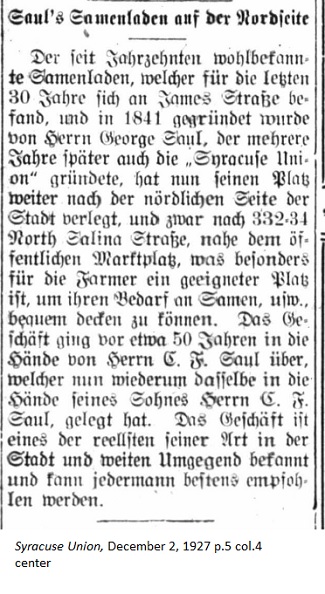
|
December 2, 1927 page 5 _____ The well-known seed store, which has been on James St. for the past 30 years and which was founded by Mr. George Saul, who many years later established the Syracuse Union, has moved to the northside of the city on 332-334 North Salina St. It is near the market place, convenient for the farmers in need of seeds, etc. The business was handed over around 50 years ago to Mr. C.F. Saul who later turned it over to his son. The store is one of the best examples of its kind, well known throughout the region and recommended by everyone. |

|
December 23, 1927 page 3 _____ One of the most remarkable characters of the World War On an October day in the year 1916 a young Englishman landed in the small harbor town of Jeddah on the Arabian coast. He had a fine knowledge of Arabic and various dialect and had a successful career in archaeology. But this was not all he had achieved to this point. For two years the young man had also been an English officer with the rank of colonel and the leader of the Arab tribes, the uncrowned king of Arabia after the annihilation of the Turkish army in Damascus. The Great War produced many extraordinary adventurers but no man's life was more fairytale-like than that of the little Oxford scholar D.E. Lawrence [sic]. And the migration from Jeddah to Damascus seems even more fantastic when one learns that Lawrence lacked any outward predisposition towards wartime heroism. He was unmilitary through and through and consistently irritated the British officers as he considered all military values anathema: he had poor posture, was undisciplined and had no regard for military rank. However he performed the highest soldierly heroic deeds and improvised the most comprehensive and successful insurrection in modern history. He was never moved to take his life as a soldier seriously. With comical self-irony he indicated his English rank of colonel in quotation marks. No pompous warrior like those cultivated by the war in Europe, he rode amid the cheers of the masses next to King Feisal into the Syrian capitol. He was a man with a blissfully dream carved from the Thousand and One Nights, which he kept secret from general staff eyes. While at the English headquarters in Cairo perhaps they might have quickly sent him back to Europe if he had told them in Jeddah in 1916 what he had intended to do in Damascus in 1918. Not comfortable as one in charge, he acted as a useful go-between with the numerous feuding Arab tribes. People either shrugged their shoulders about him or vouched for him. Allenby, later the leader of the English Palastinian Troops, had a certain understanding for the grandiose idea of a united Arab insurrection as Lawrence had envisioned it. He knew how to use the strange young man who used no rank or title and wore no uniform. Rather he wore a Arab burnoose and dealt with Arabs as equals when he came into the headquarters in Cairo surrounded by his bodyguards of notorious Bedouin robbers, murderers, and plunderers. Involuntarily people drew parallels. In Germany they would imagine the fate of a similar man. How would the Germany military know how to even begin with such a man? In Germany poets such as Hermann Hesse, who wanted to work for the prisoners of war in France, would become an office worker (understandibly under the supervision of a lieutenant.) The stature of D.E. Lawrence grew into a legend in the post-war years. Thousands of wonderous stories circulated about him in the East and the West. He practically became as legendary as the singular, secret priest-king Prester John in the Middle Ages. A thousand honors beckoned to him, the highest offices stood open for him. However he slipped back into the shadows and no one really knows what he's doing today. He wrote a memoire a few years ago, but he carefully published it only after taking meticulous precautions and insisting on a hundred provisos to the point where he never made a penny from it. A while back he again withdrew the English edition from circulation and had it destroyed. Currently in Germany Paul List Publishers out of Leipzig has published the book with its own magnificent features — D.E. Lawrence, Aufstand in der Wüste, 355 pages. After reading the book Bernard Shaw pointed out that amid the astonishing phenomena of this world there could be this absolutely amazing individual who advanced to the very limits of literary genius and at the same time be a young man, who in the early years of his life could have lived such an adventure of epic proportions. The chances for these two aspects to come together seemed to Shaw less than 1:100,000. According to Shaw D.E. Lawrence [sic] is the one in a hundred thousand. The English poet called Lawrence the author of one of the few great books of heroes in world history, and anyone who has read the book must agree with this decision. No one can miss the dazzling magic of his descriptive power and the tremendous mastery of words. D.E. Lawrence accomplished one of the great deeds of this war. To this point he has written the best book concerning the war. He is not just a great soldier but a great writer. Justifiably his Revolt in the Desert may be placed next to Caesar's masterwork De Bello Gallico. People acknowledge that this book contains ninety-nine percent of the collected poetic production of the last ten years. Naturally it is not a story for little girls and sensitive souls will turn away from the harshness, the wild and sometimes grotesque brutality which Lawrence describes. But a mature man sees behind this book a human being caught in the bloodless shadow world of our modern European literature. In closing there are a few other examples of his descriptive power and one in particular which shows us Lawrence as a human being and which is of special interest to us Germans. Lawrence described the disruption of the Turkish strategy and the overly hasty, pathetic withdrawal of the Turkish Army in October 1918: "Exceptions were the German detachments; and here, for the first time, I grew proud of the enemy who had killed my brothers. They were two thousand miles from home, without hope and without guides, in conditions mad enough to break the bravest nerves. Yet their sections held together in firm rank, sheering through the wrack of Turk and Arab like armoured ships, high-faced and silent. When attacked they halted, took position, fired to order. There was no haste, no crying, no hesitation. They were glorious."* These few, bronze-cast sentences are indeed the most beautiful words ever spoken about the German Army during the war. *Translator's Note: This quoted passage comes from an online version, page 310 of Revolt in the Desert The Future of the Missions in China _____ Without intervention the European and American missions in China will not be able to remain because of the confused leadership situation which has existed for many years. The clerics are facing countless danger and ordeals from the various armies and bands of robbers and many of them have died martyrs for their faith. However their work seems to survive all upheaval and Christianity in China has not declined. On the contrary, as reported at a meeting of the American missionary societies, the likelihood that further activity by the whites in this arena would be impossible because the Chinese Christians have secretly appointed more clerics within their congregations after having faced courteous but passive resistence from foreigners. Better knowledge of the country's language and the character of the populace makes it easier for native missionaries to replace the whites. In the foreseeable future they whites will disappear from China. Christianity may be transformed to correspond to the Chinese character in many respects. Thus we see the movement against the white race by the colored races which developed after the war. |
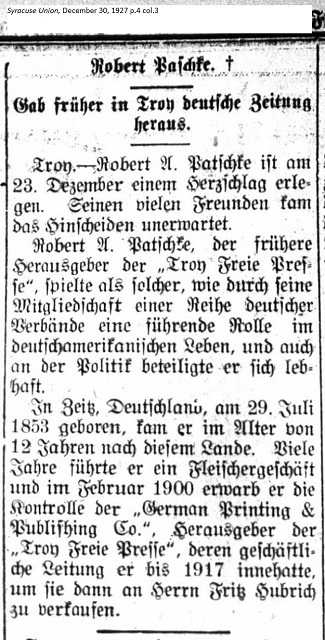
|
December 30, 1927 page 4 _____ Earlier Publisher of the Troy German Newspaper _____ Troy. — Robert A Patschke died December 23rd of a heart attack. His many friends were surprised by his sudden passing. Robert A. Patschke, former publisher of the Troy Freie Presse, played a major role in German-American life as a member of many German associations. He also actively participated in politics. Born in Zeitz, Germany on July 29th 1853, he came to this country at the age of 12. For many years he ran a butcher shop and in February 1900 he acquired control of the "German Printing & Publishing Co.", which published the Troy Freie Presse. He ran that operation until 1917, when he sold it to Mr. Fritz Hubrich. |

|
December 30, 1927 page 4 _____ (Sent in by a Reader) It may be of interest to the many readers of the Union to learn that 60 years ago on the night after Christmas in 1867, the then volunteer fire department of our 2nd Ward was quite busy battling flames to save the building known as "the old Central Tavern" from total destruction. Unfortunately the effort was in vain. The "old Tavern" burned to the ground and the next morning the members of the Turn-Verein [Gymnastics Society], when they heard the news from the tavern neighbors, were heard to say, "That's the last we'll hear of our gymnastics club!" At the time it was generally known that the Turn-Verein could not have purchased the "Old Central Tavern" without the financial help of many members and it was on that same evening that almost all of the 40 members gathered at the home of Benedikt Häberle on Butternut St. One member said, "Well, Turners, we've been left out in the cold! — But all is not lost!" These words were happily received by the other members present and necessary steps were taken to secure the insurance money and to consider other means of financing. Turner Benedikt Häberle graciously offered his yard to serve as a place to keep the gymnastics equipment. Papa and Mama Wöse offered the front room on the first floor of their house at the corner of Park and Butternut Sts. cost-free as a meeting room. Both offers were gratefully accepted. It may be added here that the young member of the Turn-Verein who remembered the neighbors saying "That's the last we'll hear of our gymnastics club!" and is now a 60 years older member remembers with pride that Turner sister, Mrs. Christine Schmeer, donated in 1869 a new American flag with staff to the newly built gymnastics hall. As she raised the flag the members of the West New York Gymnastics District offered a heartfelt cheer of "Gut Heil" [Good Health] in commemoration of Alexander von Humboldt's 100th birthday. All readers of the Syracuse Union may well come to the conclusion that the neighbors of the Turn-Verein were not prophets. Almost every day the 60 year older member of the Turn-Verein proudly salutes the Stars and Stripes hanging at the newly built State Building at the corner of West Genesee and South Warren St. On May 15, 1854 in the building at that corner, then known as the "Shakespeare Hall", the Turn Verein was brought to life by eight good, brave German-Americans. Now the birthplace of the society is decorated daily by the Stars and Stripes of our adopted country. Not only the members of our gymnastics society but all good brave German-Americans may be justifiably proud! ~ S. |
